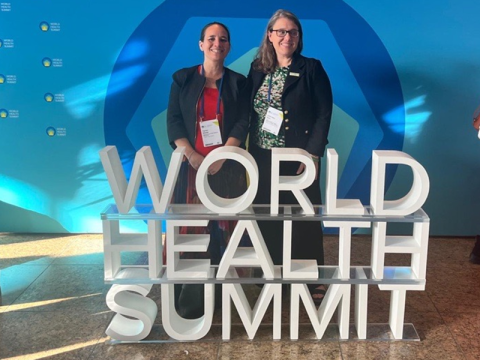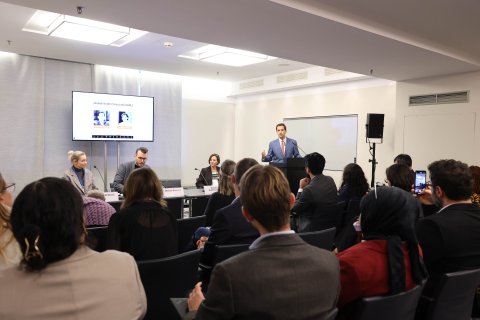Highlights from the World Health Summit 2025

The World Health Summit (WHS) is a key date in the yearly diary for global health innovation. The conference brings together stakeholders from key sectors all over the world to inspire solutions for better health and wellbeing for all.
The theme this year - ‘Taking responsibility for Health in a Fragmenting World’ - aimed to highlight that while great strides have been made in the development of global health, we are facing complex challenges with misinformation, geopolitical tension, dramatic changes to the funding landscape, the climate crisis and widening inequity.
The three-day meeting attracted over 4,000 delegates in person, with over 10,000 people joining online talks. The conference included over 70 sessions with the aim of creating a forum for dialogue and collaborative action to address global health challenges, focusing on topics such as climate and health, digital innovation, equity, and global governance.
Focus on AI, climate and conflict
The conference focused on some central issues, including global health architecture, artificial intelligence, the climate crisis, peace and health, reducing the burden of noncommunicable diseases and women’s and children’s health.
The WHS talk “From Data to Discovery: AI’s Transformative Role in Health Research” explored how artificial intelligence is reshaping global health at every stage of the research pipeline – from understanding disease mechanisms and accelerating drug discovery to improving clinical trials, genomics, and public health surveillance.
Speakers highlighted successes aided by AI, such as brain mapping, open protein modelling, and precision oncology, alongside national-scale applications like India’s Aarogya Setu platform and the UK’s Genomics England initiative. Regardless of the location, methods or results of each case study, the critical importance of robust data infrastructure, cybersecurity, ethical governance, and explainable, trustworthy AI was always emphasised. The discussion underscored that while AI offers unprecedented potential to personalise care and strengthen health systems, its success depends on equity, open science, and building trust in how data and models are developed and applied.
Many of these same themes were explored at the RSTMH Annual Meeting held in London in September. As part of our own focus on the evolving digital world, we are launching a new journal on the area of AI for global health.
Another primary focus of the meeting was equitable strategies for a resilient world in the face of the climate crisis.
Intensifying climate hazards include rising temperatures, shifting precipitation patterns, droughts, floods, and rising sea levels can influence the emergence and spread of diseases, worsening noncommunicable conditions, and heightening mental health challenges, while disproportionately affecting vulnerable communities. Integrating climate adaptation into health systems, strengthening surveillance, and ensuring access to resources is essential to address such a major threat to global health. Key talks included ‘Advancing Research for Climate and Health’ and ‘Youth at the Forefront of Climate Action for NCD Prevention’.
We know that a cross-cutting, interdisciplinary approach is required if healthcare systems are to adapt to current challenges in environmental health and successfully identify and implement novel mitigation strategies. RSTMH hopes to contribute to this conversation by collating the latest original research, reviews, and opinion pieces on the impact of environmental change on human health, to appear in our journals Transactions of the Royal Society of Tropical Medicine and Hygiene (TRSTMH) and International Health.

Key launches and announcements
The WHS is presented as a catalyst for change, and the summit provides a platform for new announcements and the launch of new programs and initiatives.
The German Government demonstrated their commitment by pledging a major financial contribution – €1 billion – to the Global Fund to Fight AIDS, Tuberculosis, and Malaria. Further into the conference, the Global Burden of Disease (GBD) 1990–2023 report was launched, a report bringing together over 17,000 collaborators across 167 countries.
The report traces how global health has shifted over three decades: from communicable and neonatal conditions being prevalent in the 1990s toward NCDs, injuries, and mental health in 2023. The report reveals significant gains in fertility, mortality, and life expectancy, while flagging persistent or worsening challenges in low-income regions, particular in the Sahel region of Africa, rising environmental and lifestyle risks and the increasing burden of chronic disease.
Speakers stressed that real progress requires investments in education, poverty reduction, and cross-sector action, and called on countries to strengthen data systems, health governance, and accountability to turn insights into action.
Also launched at the WHS was the Global Preparedness Monitoring Board (GPMB) Report and a call for the establishment of a Global Pandemic Risk Observatory. The 2025 report from GPMB titled ‘The New Face of Pandemic Preparedness’ emphasised the critical need to transform global health security when the tides of COVID-19 are still being felt.
The session and report also proposed that the vision of a Global Pandemic Risk Observatory would support the implementation of the International Health Regulations and the WHO Pandemic Agreement, strengthening strategic planning through impartial and coordinated risk monitoring.
During the conference, the Global Health Policy Lab (GHPL) also announced the Digital Repository for Health Policy. Health policies play a vital role in shaping the conditions for healthier lives – but too often health policymaking can be complex, fragmented, and not always seamlessly connected with the full range of evidence that could strengthen it. The Global Health Policy Lab (GHPL) sets out to overcome these challenges by providing the knowledge, tools, and competencies needed to support smarter, evidence-informed policymaking.
The Digital Repository for Health Policy, an AI-enabled platform that brings together health policies from around the world. Yet modest in scope, the repository with time will span many health areas, offer multilingual access, and provide all this information in one open, user-friendly space. By improving access to this information, GHPL aims to support learning, international collaboration, and the development of stronger, evidence-based health policies.
The WHS concluded with a strong call for increased collaboration and accountability in advancing global health. Across sessions, leaders and researchers highlighted that the future of health depends on integrating science, technology, and equity – bridging disciplines, sectors, and regions to deliver sustainable impact.